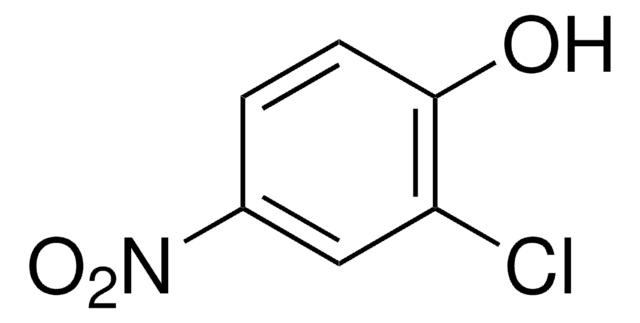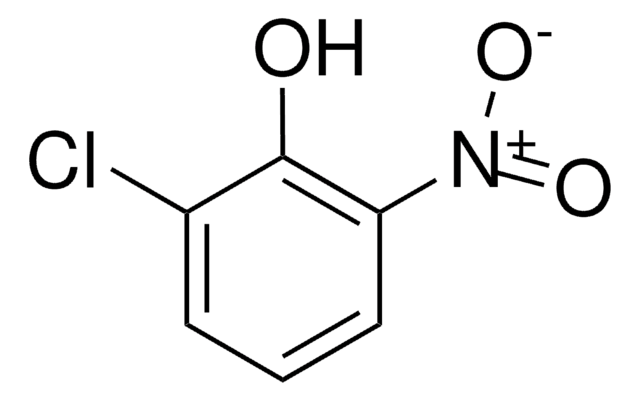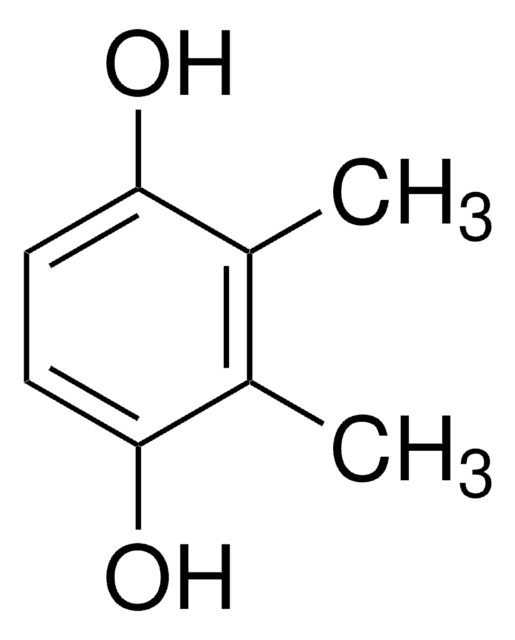343382
2-Chloro-1,4-benzoquinone
95%
Iniciar sesiónpara Ver la Fijación de precios por contrato y de la organización
About This Item
Fórmula empírica (notación de Hill):
C6H3ClO2
Número de CAS:
Peso molecular:
142.54
MDL number:
UNSPSC Code:
12352100
PubChem Substance ID:
NACRES:
NA.22
Productos recomendados
assay
95%
functional group
chloro
ketone
SMILES string
ClC1=CC(=O)C=CC1=O
InChI
1S/C6H3ClO2/c7-5-3-4(8)1-2-6(5)9/h1-3H
InChI key
WOGWYSWDBYCVDY-UHFFFAOYSA-N
Categorías relacionadas
General description
2-Chloro-1,4-benzoquinone is a quinone derivative. It is one of the intermediate formed during the degradation of 3,4-dichloroaniline in a dielectric barrier discharge plasma reactor. It is formed during lignin peroxidase catalyzed oxidation of 2-chloro-1,4-dimethoxybenzene. 2-Chloro-1,4-benzoquinone on dechlorination yields 1,2,4-trihydroxybenzene.
Application
2-Chloro-1,4-benzoquinone may be used in the preparation of chloro derivatives of prenylnaphthohydroquinone.
signalword
Warning
hcodes
Hazard Classifications
Eye Irrit. 2 - Skin Irrit. 2 - STOT SE 3
target_organs
Respiratory system
Storage Class
11 - Combustible Solids
wgk_germany
WGK 3
flash_point_f
Not applicable
flash_point_c
Not applicable
ppe
dust mask type N95 (US), Eyeshields, Gloves
Elija entre una de las versiones más recientes:
¿Ya tiene este producto?
Encuentre la documentación para los productos que ha comprado recientemente en la Biblioteca de documentos.
Los clientes también vieron
An ecologically effective water treatment technique using electrochemically generated hydroxyl radicals for in situ destruction of organic pollutants: Application to herbicide 2, 4-D.
Oturan MA.
J. Appl. Electrochem., 30(4), 475-482 (2000)
Emily N Vebrosky et al.
Journal of agricultural and food chemistry, 67(27), 7609-7615 (2019-07-02)
Shallow water systems are uniquely susceptible to environmental processes such as photolysis and hydrolysis that can influence the dissipation of pesticides into sediments. The fungicide dicloran has previously been shown to undergo photolysis and is reported to dissipate in soils
R Grey et al.
Journal of basic microbiology, 38(5-6), 371-382 (1999-01-01)
The white-rot fungus Trametes versicolor was used to study the influence of extracellular laccase activity on the degradation of 2-chlorophenol (2-CP) and the formation of metabolites under conditions, characterized by the absence of other phenol-oxidizing enzymes. 2-CP enhanced the production
P J Teunissen et al.
Archives of biochemistry and biophysics, 360(2), 233-238 (1998-12-16)
2-Chloro-1,4-dimethoxybenzene (2Cl-1,4-DMB) oxidation by lignin peroxidase (LiP) proceeds via the formation of the 2Cl-1,4-DMB cation radical as indicated by ESR and UV/vis spectroscopy. The products of the LiP-catalyzed oxidation of 2Cl-1,4-DMB were identified as 2-chloro-1,4-benzoquinone and the dimers dichlorotetramethoxybiphenyl and
Aurora Molinari et al.
Bioorganic & medicinal chemistry, 13(11), 3841-3846 (2005-06-21)
From the Diels-Alder adduct between alpha-myrcene and 2-chloro-1,4-benzoquinone, a family of chloro derivatives of prenylnaphthohydroquinone have been synthesised and evaluated for their cytotoxicity against 14 neoplastic cell lines.
Nuestro equipo de científicos tiene experiencia en todas las áreas de investigación: Ciencias de la vida, Ciencia de los materiales, Síntesis química, Cromatografía, Analítica y muchas otras.
Póngase en contacto con el Servicio técnico














